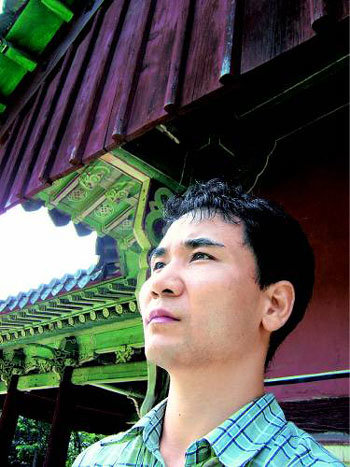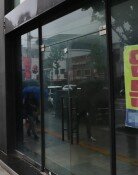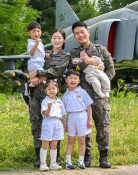Embrace the World Like Friends

Poet Yoo Jong-in was born in 1968 in Incheon and celebrates his 10th anniversary of his debut this year. His first poetry collection, Eating Sadness Sparingly (2001), was compiled out of a passion to challenge and escape the world he lived in.
His new collection, Ode to Friends, has a backdrop of a deeper maturity where the sacred and vile, death and life caress each others faces wistfully like friends and walk hand in hand out onto the stage. This backdrop that embellishes the indifferent world with finely tuned words allows for the original form of lyric poetry to become prominent.
On a palm cactus/So many, more than Golgothas Jesus/Needles like nails are embedded in the hand//( )//No, even with countless needles/The cactus never alone/Pricks its fingers/No shadows/Curious winds, to hear the blue clapping/Passes like shaking a saints wrist. (An excerpt from Needles)
The imagination of the poet that blends in a prickly cactus with invisible winds comes from a faith and hope that what seems like a segregated world is actually connected by a single root.
On returning from a stroll in his old neighborhood and seeing its shabbiness, the poet recites in Wild Neighborhood, Can there be a wilder neighborhood than my heart? His imagination is embedded in the thought that if the world is tough, it may be because your heart is so. Through the wit and leisure that he exhibits from observing his surroundings detachedly, he produces poems that are both rich and tender.
In the compartments of a beaten truck/Theres a landscape frame/The Mold/Spreads out to the autumn sky with flying geese/As if curious, it peeks at the spring sunlight. (Excerpt from Wandering Landscape)
In the poets mind, this kind of humorous imagination seeps into even the most remote corners.
The camellia pot in the new church bathroom/Glances out the frosted window//When even God is doing a number two/The flushing toilet was good, in the sky/There is no bitter aftertaste. In the sky/paper with silky skin like tissue/Of course doesnt exist//Camellia, your flower lips only took notice, no/Maybe because of those red private lips/Everything private can bloom this winter/So beautifully. (Excerpt from Bathroom Camellia)
In the poets mind where dreams of a reconciliation in which all relationships between humans, nature, and all else can become friends, footsteps to find purity exist. In those footsteps, there is a sadness that perhaps that kind of purity may never be found, or that it could vanish. This sadness that brings such depth to this anthology is one of its greatest brilliances.
Snow fell/In the dark/Scattered silence//The falling snow is not a friend/If it piles on the floor/It will be trodden//( )//The falling friend/So many so white and futile/Will be dirtied by me/The snow that hasnt fallen/Is the most pure, kind snow/Dead friends or unacquainted ones/Are the best friends. (Passage from Ode to Friends)
Ki-Tae Kwon kkt@donga.com







